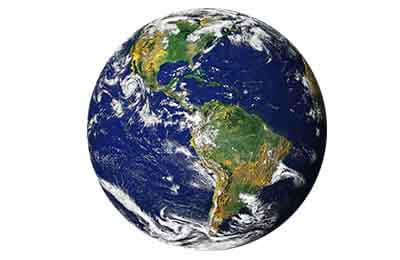火星,下一个地球?
时间:2022-10-05 12:34:55

In the not-too-distant future, humans may have the tools to transform Mars from a cold red desert into a habitable[可居住的] world. But importing[输入] life and turning Mars green will raise questions that we’ve never faced before.
Chris McKay (Astrobiologist): We can restore habitable conditions to Mars. The fact that we can, to me, opens up the question: should we? What we do will, I think, set the pattern[模式] that will reflect on[反映] us as a species[物种] for the rest of time. Mars will be where we set the precedent[先例], and that’s why I think it’s very important that we do it carefully.
There’s no sign of life on Mars today and every reason to believe that it can’t exist on the surface. The lack of water and shelter[遮挡] from radiation[辐射] guarantee[保证] that. But there could be ancient microbes[微生物] frozen in the ground needing only warmer temperatures to wake up. If so, they could answer the biggest question in space science: Has life originated[起源] more than once in the universe?
Mars and Earth have been swapping[交换] rocks for billions of years. What’s knocked off one planet by an asteroid[小行星] strike[攻击] often lands on the other, and it’s not inconceivable[不能想像的] that microbes have sometimes gone along for the ride. So life on Earth may have come from Mars or vice versa[反之亦然], which would be interesting but tell us nothing about whether life originated anywhere else.
But, if Martian life turned out to be unrelated, a separate origin just one planet away in our own solar system, that would suggest that life crops up[突然出现] wherever the conditions are right, and a universe with billions of galaxies and trillions of stars could be teeming[大量出现] with life. It might also mean that life from Earth could be a threat to Martian life.
So how should terraformers[将(另一行星)改造成地球般的人] treat the natives, if there are any?
McKay: It would be best to try to answer that before we started warming up Mars, because what we do depends on the answer to that question. If we find that Mars has life that’s the same as Earth’s, then it doesn’t matter and we move down the path of sharing life from Earth with Mars. But if we find that Mars does have life and that life is a separate independent origin of life, then we do things completely differently, in my view.
In that case, McKay thinks we should sterilize[杀菌] all of our old space junk left over from previous[早先的] missions. Even hundreds of years later, it could still be contaminated[污染] with bacteria[细菌] from Earth, and then we should leave Mars to the Martians. McKay: I would say our responsibility[责任] is to encourage that life to flourish[茂盛] and thrive[茁壮成长]. Diversity[多样性] in life across planets is a good thing, and we would learn an enormous[巨大的] amount about how another biosphere[生物圈] based on that life might work, and that knowledge could revolutionize[使彻底变革] our understanding of fields like medicine and agriculture, as well as helping us understand the Earth by having a comparison biosphere.
But not everyone would go along with[赞同] that approach, especially after going to the trouble of making Mars habitable.
Robert Zubrin (President, Mars Society): I don’t agree that that is a rational[理性的], ethical[合乎道德的] position. The ethics[道德,伦理] need to be based on what is good for people, not what is good for bacteria. This idea of depriving[剥夺] humanity of a fully living world, not just for humans but for a wonderful ecosystem of plants and animals and birds and fishes and all of this in order to preserve this place for bacteria, is lunacy[精神失常].
The alternative[另一可选择的], though, is to play the role of the ruthless[无情的] invader from another planet.
David Grinspoon (Astrobiologist): You think of The War of the Worlds注 kind of scenarios[情节] and all these creepy science fiction stories about aliens coming and saying, “Wow, we want your planet. We’re gonna kill you.”You know, we think of that as evil. I mean that’s just not being a good neighbor. But I’m fairly convinced that we won’t have this problem because I don’t think there is life on Mars.
在不久的将来,人类的科技产物也许能把火星从一个寒冷的红色沙漠变成一个适宜居住的星球。然而,引入生命并让火星披上绿色,将带来一系列我们从未遇过的问题。克里斯·麦凯(天体生物学家):我们能够让火星恢复宜居的环境。然而对我来说,我们能够这样做这一事实会引发一个问题:我们是否应该这么做?我想,我们的所作所为将为今后树立一个范例,反映出我们是一个怎样的物种。火星将成为我们的先例。出于这个原因,我认为我们应当谨慎行事,这一点非常重要。
目前火星上没有任何生命迹象,而且完全有理由相信生命不可能存在于火星表面。火星表面缺乏水,也没有可以抵挡辐射的防护层——这些条件确保了这一点。然而,地表之下可能冻结着一些远古微生物,也许只需要温度升高即可复苏。若是如此,它们便能回答宇宙学上最大的疑问:在宇宙中,生命起源是否不止一个?
几十亿年来,火星与地球一直在互相交换岩块。由于受到小行星撞击而脱离其中一颗行星的物体,常常会降落到另一颗行星上。偶有微生物搭上这趟顺风车也不足为奇。因此,地球上的生命有可能来自火星,反之亦然。尽管这一点很有趣,但它仍然无法告诉我们生命是否起源于其他地方。
不过,假如火星生命最终被证实是独立体系——在我们的太阳系中,与我们的地球仅仅一星之隔的这个行星,有着自己的生命起源,那便意味着只要条件适宜,生命就会萌芽;在一个拥有数十亿星系和数万亿颗恒星的宇宙当中,生命可能随处可见。这也可能意味着,源于地球的生命可能会对火星生命构成威胁。
那么,假如真有火星生物的话,想把火星改造成地球的人又该如何对待它们呢?
麦凯:让火星变暖之前,我们最好先试着回答这个问题。因为我们要怎样做,取决于我们对这个问题的回答。假如我们发现火星上有和地球上一样的生命,这个问题便无关紧要了,我们可以一路走下去,与火星共享来自地球的生命。但如果火星上确实存在生命,并且有其独立生命起源,那么依我看来,我们要做的事情将截然不同。
麦凯认为,在这种情况下,我们应该对以往任务中遗留下来的所有太空垃圾进行消毒杀菌。即使数百年后,火星仍有可能被来自地球的细菌污染。然后,我们应该把火星留给火星人。
麦凯:我认为我们的责任是促进火星上的生命繁荣发展。各个行星的生命多样性是一件好事;我们可以了解很多,认识到以该生命为基础的另一个生物圈是如何运作的,而这种知识或将颠覆我们对诸如医学和农业等领域的理解;因为我们有了一个可供对比的生物圈,这会帮助我们更好地认识地球。
然而,并非所有人都赞同这种做法,尤其是在不辞劳苦地把火星改造成宜居地之后。
罗伯特·祖布林(火星协会主席):我不认为那是一种理性的、合乎道德的见解。道德的标准要以什么对人们有益——而不是什么对细菌有益为基础。为了将这个地方留给细菌,而从人类手中——不仅是从人类手中,也是从一个包含动物、植物、鸟类、鱼类等各种生物构成的奇妙生态系统手中——夺走一个活生生的世界,这种想法简直是发疯。
然而,除此以外我们还有另一种选择,就是扮演来自另一个星球的无情入侵者。
戴维·格林斯普(天体生物学家):你会联想到《世界大战》那样的剧情,以及所有令人毛骨悚然的关于外星人入侵的科幻小说,入侵者来到地球,说:“噢!我们想要你们的星球,我们要杀了你们。”你知道,我们将这种行径视为邪恶。我的意思是,这可不是一个好邻居做的事。但我相当肯定我们不会遇到这个问题,因为我认为火星上并不存在生命。
Know More
好奇号——新一代火星探测车
被称为“好奇号”的火星科学实验室(Mars Science Laboratory)是美国国家航空航天局的探测车计划,于2011年11月26日发射,2012年8月6日成功登陆火星盖尔撞击坑。好奇号造价高达25亿美元,是迄今为止最大的火星探测车,比2004年登陆的火星探测车“机遇号”(Opportunity)和“勇气号”(Spirit)重五倍,长两倍。比起之前其他火星任务,它携带了更多先进科学仪器。好奇号将会分析数十个样本,从泥土挖出物质,从岩石中钻取粉末,并预计运作至少一个火星年(约两个地球年),其探测范围比起之前任何火星探测车都要大。它还要调查火星以前或现在维持生命的可能性。
注:英国小说家赫伯特·乔治·威尔斯(Herbert George Wells,1866-1946)在1898年发表的一部科幻小说。小说描写在19世纪末期,火星人从即将灭亡的火星来到地球,对英国发动战争,进而希望统治全世界。人类最初和他们进行了友好的会晤,和平希望被扼杀后才同火星人展开战斗。CE:Teens曾在2011年10月号的“探索区”介绍过由该小说改编的广播剧。
